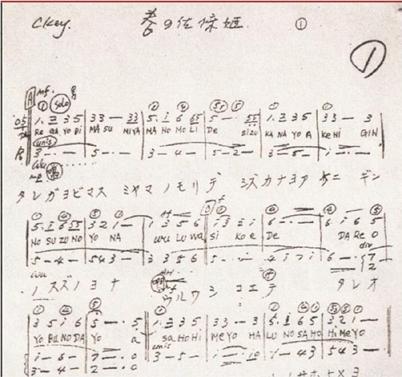
3 minute read
Being the Change We Seek
Angelica Dunsavage
Iam honored to write this, my first letter as Chief Editor of Publications for The Choral Scholar and American Choral Review . First, I would like to thank Mark Nabholz, previous editor, for his guidance as well as the current NCCO Executive Board for entrusting this publication to myself and the editorial board. I would also like to introduce new members and positions to our editorial board:
Advertisement
• Jace Saplan has shifted their role as previous Associate Editor for Recording Reviews to a new column dedicated to Affinity Group and ADEI-based work. This new column premieres in this edition.
• Morgan Luttig has joined the board as Associate Editor for Recording Reviews
• Nathan Reiff has joined the board as Associate Editor for Score Reviews
• Michael Porter is taking on the work of our newly combined publication as Associate Editor for the Research Memorandum Series. This addition to The Choral Scholar will be published annually to include dissertation and thesis abstracts from recent masters and doctoral students.
• To aid authors in developing topics and writing style, the editorial board has invited a team of Editorial Mentors. These mentors are available upon request to provide feedback and direction for completed articles, or ideas in progress. Our three Editorial Mentors are Hilary Apfelstadt, Edward Maclary, and Magen Solomon.
Merriam Webster defines scholarship as “the character, qualities, activities, or attainments of a scholar.” Why then, does the practice of scholarship so often get reduced to a word count, formatting style, topic, or publication type? With this reflection comes the acknowledgement that the choral field has a history of preference to certain scholarship, and scholars, at the exclusion of others. The Choral Scholar, with the support of the Mission, Vision, and Governance committee, is committed to opening the door to scholarly expression in a way that is equitable, diverse, and responsive to the needs of 21st-century choral scholars. In this framework, we are excited to announce the following changes to our submission guidelines present on our website, https://nccousa.org/publications/the-choral-scholar-americanchoral-review:
• Peer-reviewed articles will remain a feature of this publication. Authors who wish to submit completed articles for peer announce the following changes to our submission guidelines present on our website, https://nccousa.org/publications/the-choral-scholar-americanchoral-review: review are encouraged to do so but will have the option for additional feedback from an Editorial Mentor if requested.
• Peer-reviewed articles will remain a feature of this publication. Authors who wish to submit completed articles for peer review are encouraged to do so but will have the option for additional feedback from an Editorial Mentor if requested.
• Submissions are now open for article ideas and works in progress. We would like to hear from a growing number of authors, particularly those who may have been uninspired to submit an article, and commit to guiding groundbreaking ideas into publication.
• Submissions are now open for article ideas and works in progress. We would like to hear from a growing number of authors, particularly those who may have been uninspired to submit an article, and commit to guiding groundbreaking ideas into publication.
• The Choral Scholar will be expanding to include new methods of scholarship, including interviews, videos, creative writing, and podcasts. If you have an idea to share, or want to get involved, please see our website or email editor@ncco-usa.org
• The Choral Scholar will be expanding to include new methods of scholarship, including interviews, videos, creative to share, or want to get involved, please see our website or email editor@ncco-usa.org
The Choral Scholar and American Choral Review is a reflection of NCCO: it is our organization’s mission and vision put into the practice of research. As such, this edition challenges us to move forward into change. Patrick Freer’s article A Beloved Community reminds that there is much work to be done to align the choral field’s values with its research. Kirsten Hedegaard’s article Environmentalism through Choral Music highlights how choral music can be a message for social change. Nicholas Sienkiewicz combines psychology with musical analysis to unpack the emotional impact of Considering Matthew Shepard. We hope that this publication continues to expand possible and change we seek.
The Choral Scholar and American Choral Review is a reflection of NCCO: it is our organization’s mission and vision put into the practice of research. As such, this edition challenges us to move forward into change. Patrick Freer’s article A Beloved Community reminds that there is much work to be done to align the choral field’s values with its research. Kirsten Hedegaard’s article Environmentalism through Choral Music highlights how choral music can be a message for social change. Nicholas Sienkiewicz combines psychology with musical analysis to unpack the emotional impact of Considering Matthew Shepard We hope that this publication continues to expand what is possible in choral scholarship and be the change we seek.
Sincerely,
Sincerely,
Angelica Dunsavage Chief Editor of Publications
Angelica Dunsavage Chief Editor of Publications





